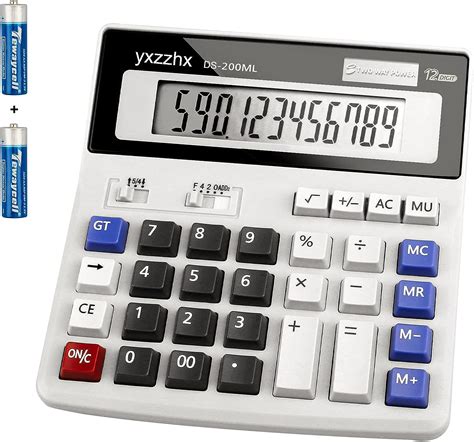Large Digit Calculator

The development of large digit calculators has been a significant milestone in the field of mathematics and computer science. These calculators are designed to handle extremely large numbers, often exceeding the limits of standard calculators. With the ability to process and display large digits, these calculators have become essential tools for mathematicians, scientists, and engineers working with complex numerical computations.
One of the primary applications of large digit calculators is in the field of cryptography. Cryptographic algorithms, such as RSA and elliptic curve cryptography, rely heavily on large prime numbers and modular arithmetic. Large digit calculators enable researchers to perform calculations with these large numbers, which is crucial for developing secure cryptographic protocols. For instance, the RSA algorithm uses large prime numbers to create public and private keys, and large digit calculators are necessary for generating and processing these keys.
Key Points
- Large digit calculators are designed to handle extremely large numbers, exceeding the limits of standard calculators.
- These calculators are essential tools for mathematicians, scientists, and engineers working with complex numerical computations.
- Large digit calculators have applications in cryptography, numerical analysis, and scientific simulations.
- The development of large digit calculators has been driven by advances in computer architecture and algorithm design.
- Large digit calculators are used in various fields, including mathematics, computer science, physics, and engineering.
Architecture and Design

The architecture and design of large digit calculators are critical factors in their development. These calculators typically employ specialized computer architectures, such as arbitrary-precision arithmetic or modular arithmetic, to handle large numbers. The design of large digit calculators involves a deep understanding of numerical analysis, computer science, and mathematics. For example, the GNU Multiple Precision Arithmetic Library (GMP) is a widely used library for arbitrary-precision arithmetic, and it provides a robust framework for developing large digit calculators.
One of the key challenges in designing large digit calculators is optimizing their performance. Large numbers require significant computational resources, and efficient algorithms are necessary to perform calculations quickly. Researchers have developed various techniques, such as the use of lookup tables and pipelined architectures, to improve the performance of large digit calculators. Additionally, the development of new algorithms and data structures, such as the Fast Fourier Transform (FFT) and the segmented sieving algorithm, has enabled large digit calculators to process large numbers more efficiently.
Applications in Numerical Analysis
Large digit calculators have numerous applications in numerical analysis, including the solution of partial differential equations, linear algebra, and optimization problems. These calculators enable researchers to perform high-precision calculations, which is essential for many scientific and engineering applications. For instance, in fluid dynamics, large digit calculators are used to simulate complex fluid flows and calculate precise values of physical quantities, such as pressure and velocity.
| Application | Description |
|---|---|
| Cryptography | Large digit calculators are used to perform calculations with large prime numbers and modular arithmetic. |
| Numerical Analysis | Large digit calculators are used to solve partial differential equations, linear algebra, and optimization problems. |
| Scientific Simulations | Large digit calculators are used to simulate complex phenomena, such as weather patterns and material properties. |

Future Directions

The future of large digit calculators is exciting and promising. As computer architectures and algorithms continue to evolve, we can expect to see significant improvements in the performance and applications of large digit calculators. One area of research is the development of quantum computers, which have the potential to revolutionize the field of numerical computation. Quantum computers can perform certain calculations much faster than classical computers, and they may enable the development of even more powerful large digit calculators.
Another area of research is the development of homomorphic encryption, which enables calculations to be performed on encrypted data. This technology has the potential to significantly improve the security of large digit calculators and enable new applications in fields such as finance and healthcare. For example, homomorphic encryption can be used to perform calculations on sensitive medical data without compromising patient privacy.
What are the primary applications of large digit calculators?
+The primary applications of large digit calculators are in cryptography, numerical analysis, and scientific simulations.
How do large digit calculators optimize their performance?
+Large digit calculators optimize their performance through the use of specialized computer architectures, efficient algorithms, and techniques such as lookup tables and pipelined architectures.
What is the future of large digit calculators?
+The future of large digit calculators is promising, with advances in computer architecture and algorithm design expected to improve their performance and applications. Quantum computers and homomorphic encryption are two areas of research that may significantly impact the development of large digit calculators.
Meta Description: Learn about large digit calculators, their applications, and future directions. Discover how these calculators are used in cryptography, numerical analysis, and scientific simulations, and how they are optimized for performance.



